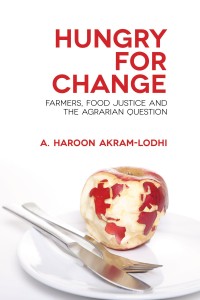Review in the Chronicle Herald

Hungry for Change
Farmers, Food Justice and the Agrarian Question
It’s unfortunate but a bit ironic that A. Haroon Akram-Lodhi chose the title Hungry for Change for his new book on world food issues. A similarly named book, and accompanying documentary, came out last year, but are focused more on breaking free of dieting crazes and returning to eating real foods.
Akram-Lodhi’s book will make readers uncomfortable as he challenges everyone to help change what he calls the “capitalist world food system” that is forcing small, genuine “family” farmers to live on the margins of near starvation in many parts of the world.
The statistics are daunting. Almost a billion people worldwide are chronically malnourished, and another billion are “under the immanent existential threat of not knowing for sure where their next meal is coming from.”
Juxtapose these malnourished millions with the billion who are overweight and the 500 million who are clinically obese, and it’s obvious that something is very wrong with food production, manufacturing and distribution throughout the world. It’s not just a developing nation problem, the author stresses, highlighting the many in North America, our comfortable culture, who are overweight but improperly nourished, living as they do on pre-packaged products laced with sugars, salts and artificially added “nutrients”.
The author teaches agrarian political economy at Trent University in Peterborough, Ontario, so his credentials to write this book are sterling. He sees very clearly that there are ever-widening gaps between those with food security and those without. He lays the blame strictly on capitalism, and how governments allow multinational corporations to control much of the food supply while also ravaging the environment and societies around the world.
In one thought provoking passage, he states that the Arab Spring of 2011 was more about food security than about politic regimes: “the cry for freedom and against poverty was a cry for bread.”
What needs to change? Akram-Lodhi doesn’t leave us wallowing in utter gloom over this global crisis. He highlights numerous grassroots movements, both local and global, that are aiding in a gradual shift toward food security for more of the world, from the farm-to-fork movement to fairly traded products to a return to more truly local, seasonal eating of foods. We need to turn away from the overly processed, ready-to-eat foods that crowd so many shelves in grocery stores, and cook for ourselves using real ingredients. He calls for promoting agroecological farming, which is different from the already co-opted organic movement (which has become part of Big Agriculture, nicknamed Big Organic by the author); farming with nature rather than against it, feeding the soils instead of degrading them, focusing more on local living and eating rather than on the need for globally produced strawberries available 12 months a year. He wants to see these changes happen on a global scale, but doesn’t exactly say how they are to happen.
Akram-Lodhi is at his best when talking about real people around the world he has met and spoken with; the starving sharecropper and his wealthy overlord in Pakistan, the overweight but hungry college student in a Canadian city, the Fijian woman buying canned imported tuna rather than fresh, local fish. Where he falters – or perhaps where his editor falters – is in allowing his text to become too ponderous for most readers, with run-on sentences laced with the jargon so beloved of many academics.
What could be an important text with a world-changing message thus tends to flounder at times in tedium and offer too few concrete solutions for taking action. - Jodi DeLong for the Chronicle Herald

